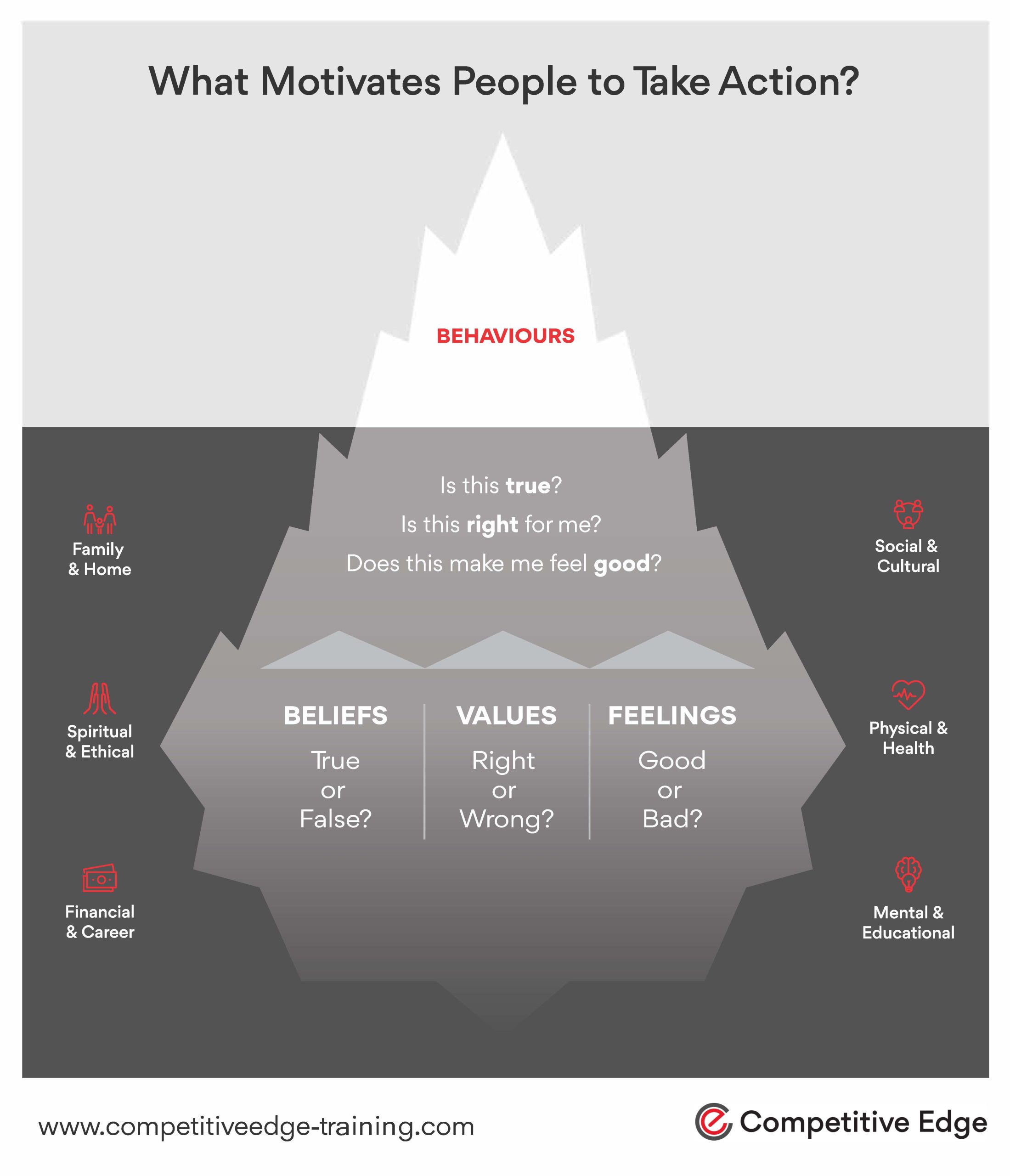In the modern workplace, understanding what truly motivates your team is crucial for leadership success. In this article we challenge common assumptions about motivation and attempt to offer a deeper understanding of what drives individuals to perform at their best.
Understanding Motivation
Leaders often assume that certain behaviours indicate ambition and therefore motivation. Behaviours like staying late, always going the ‘extra mile’ or working weekends.
However, motivation is complex and unique to everyone. We bring our whole ‘self’ to work, encompassing our hopes, fears, challenges, and entire value system. Understanding these facets is key to fostering genuine motivation.
Motivation is not just about what we do but also about how and why we do it. The traditional view focuses on observable behaviours, but a deeper understanding requires looking at the underlying factors that drive those behaviours. Put simply, our actions are driven by three factors our beliefs, our values and our feelings. Each with a binary question at its heart:
- Beliefs – Is this true or false?
- Values – Is this right or wrong for me?
- Feelings – Does this make me feel good or bad?
Therefore, a team member’s most positive response is determined by something they believe to be true, is right for them, and makes them feel good.
Individual Differences in Motivation
It’s clear that not everyone is motivated by the same things. A leader cannot simply impose motivation on a team or person; their worldview, feelings, values, and beliefs shape each individual’s motivation. For instance, some individuals may be driven by a need for achievement, while others might be more motivated by a sense of belonging or purpose.
“Motivation is a fire from within. If someone else tries to light that fire under you, chances are it will burn very briefly.”
— Stephen R. Covey
To effectively lead and motivate a diverse team, it’s essential to recognise and appreciate these differences. This means taking the time to understand each team member’s personal drivers and adjusting leadership approaches accordingly. Personalised motivation strategies will help in creating a more engaged and productive workforce.
Self-Determination Theory (SDT)
Self-Determination Theory (SDT), developed by psychologists Edward Deci and Richard Ryan, examines factors influencing human motivation and personality development. According to SDT, optimal well-being and performance are achieved when individuals experience three innate psychological needs:
- Autonomy: Control over one’s behaviour and goals.
- Competence: Mastery of necessary skills.
- Connection (Relatedness): Sense of belonging and attachment to others.
SDT emphasises that these needs are universal and essential for psychological health. When these needs are met, individuals are more likely to be motivated, engaged, and satisfied with their work. Conversely, when these needs are thwarted, motivation and well-being can suffer or, worse still, become demotivators!
In his book “Drive: The Surprising Truth About What Motivates Us,” Daniel H. Pink explores the psychology of motivation, emphasising the power of intrinsic motivation. He identifies three core elements that foster intrinsic motivation—autonomy, mastery, and purpose. Pink argues that traditional extrinsic rewards like money and bonuses are not as effective in driving long-term motivation as previously thought.
Pink’s insights align closely with the principles of Self-Determination Theory, suggesting that when individuals have the freedom to make choices (autonomy), are challenged to improve (mastery) and understand the bigger picture behind their work (purpose), they are more likely to be intrinsically motivated. This intrinsic motivation leads to higher creativity, engagement, and satisfaction.
To motivate your team effectively:
- Ensure that the company’s new priorities resonate with employees.
- Align these priorities with their day-to-day experiences.
- Make these priorities easily recallable, feasible, and desirable.
Leaders must communicate the relevance and importance of these priorities in a way that connects with the individual’s goals and values. By doing so, employees can see how their work contributes to the organisation’s larger mission, enhancing their sense of purpose and motivation.
Me to We: Aligning Values and Working Together
Leaders must gain a deeper understanding of individual values and worldviews. By aligning these personal values with business goals, leaders can create an environment that stimulates the right behaviours. Working together, leaders and employees can ensure their values are in harmony, driving personal and organisational success.
Creating this powerful culture involves open communication, trust, and a genuine interest in each team member’s well-being. Leaders should engage in regular conversations with their team members to understand their motivations and challenges. This approach helps create a supportive atmosphere where employees feel valued and understood.
Building a Motivating Environment
To foster a motivating environment, leaders should focus on:
- Empowerment: Giving employees the authority and resources to make decisions about their work.
- Recognition: Regularly acknowledge and reward efforts and achievements.
- Growth Opportunities: Providing opportunities for career advancement.
- Supportive Culture: Building a culture of trust, collaboration, and mutual respect.
- Training and Development: Invest in your people’s knowledge, skills and professional development.
By focusing on these areas, leaders can help create a workplace where employees are motivated not just to meet but exceed their job requirements and thrive.
Understanding and leveraging individual motivations is essential for effective leadership. By recognising the uniqueness of each team member and aligning their values with organisational goals, leaders can foster a motivated, committed, and high-performing team. Start today by exploring your team’s intrinsic motivations and creating an environment that nurtures their potential. The effort you invest in understanding and supporting your team will pay off through enhanced productivity, loyalty, and overall success for your organisation.


